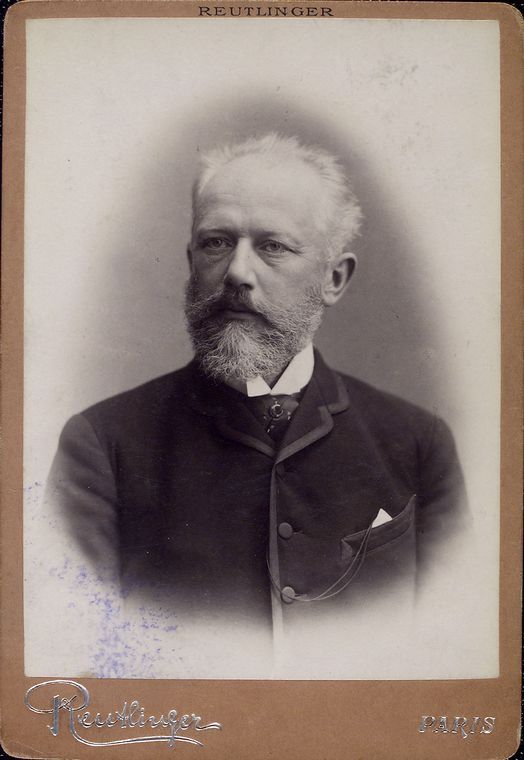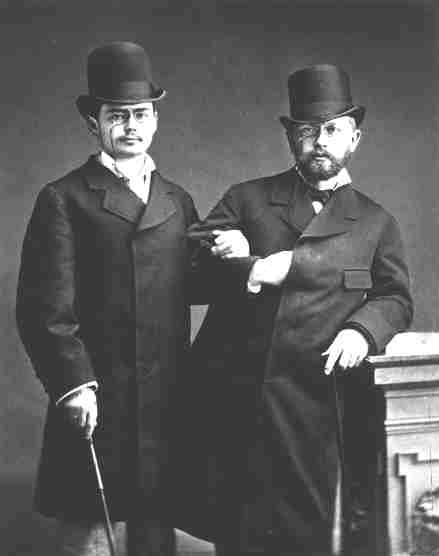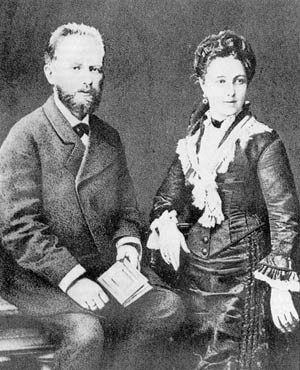Pyotr Ilyich Tchaikovsky

7 May 1840 [O.S. 25 April]
6 November 1893 [O.S. 25 October]
This name uses Eastern Slavic naming customs; the patronymic is Ilyich and the family name is Tchaikovsky.
Pyotr Ilyich Tchaikovsky (English: /tʃaɪˈkɒfski/ chy-KOF-skee; Russian: Пётр Ильич Чайковский, tr. Pyótr Ilʹyích Chaykóvskiy, IPA: [pʲɵtr ɪlʲˈjitɕ tɕɪjˈkofskʲɪj] ( listen); was a Russian composer of the romantic period, whose works are among the most popular music in the classical
repertoire. He was the first Russian composer whose music made a
lasting impression internationally, bolstered by his appearances as a
guest conductor in Europe and the United States. He was honored in 1884
by Emperor Alexander III, and awarded a lifetime pension.
listen); was a Russian composer of the romantic period, whose works are among the most popular music in the classical
repertoire. He was the first Russian composer whose music made a
lasting impression internationally, bolstered by his appearances as a
guest conductor in Europe and the United States. He was honored in 1884
by Emperor Alexander III, and awarded a lifetime pension.
Although musically precocious, Tchaikovsky was educated for a career as a civil servant.
There was scant opportunity for a musical career in Russia at that time
and no system of public music education. When an opportunity for such
an education arose, he entered the nascent Saint Petersburg Conservatory,
from which he graduated in 1865. The formal Western-oriented teaching
he received there set him apart from composers of the contemporary nationalist movement embodied by the Russian composers of The Five,
with whom his professional relationship was mixed. Tchaikovsky's
training set him on a path to reconcile what he had learned with the
native musical practices to which he had been exposed from childhood.
From this reconciliation he forged a personal but unmistakably Russian
style—a task that did not prove easy. The principles that governed
melody, harmony and other fundamentals of Russian music ran completely
counter to those that governed Western European music; this seemed to
defeat the potential for using Russian music in large-scale Western
composition or for forming a composite style, and it caused personal
antipathies that dented Tchaikovsky's self-confidence. Russian culture
exhibited a split personality, with its native and adopted elements
having drifted apart increasingly since the time of Peter the Great. This resulted in uncertainty among the intelligentsia about the country's national identity—an ambiguity mirrored in Tchaikovsky's career.
Despite his many popular successes, Tchaikovsky's life was punctuated by personal crises and depression. Contributory factors included his early separation from his mother for boarding school followed by his mother's early death, the death of his close friend and colleague Nikolai Rubinstein,
and the collapse of the one enduring relationship of his adult life,
which was his 13-year association with the wealthy widow Nadezhda von Meck who was his patron even though they never actually met each other. His homosexuality,
which he kept private, has traditionally also been considered a major
factor, though some musicologists now downplay its importance.
Tchaikovsky's sudden death at the age of 53 is generally ascribed to cholera; there is an ongoing debate as to whether cholera was indeed the cause of death, and whether his death was accidental or self-inflicted.
While his music has remained popular among audiences, critical
opinions were initially mixed. Some Russians did not feel it was
sufficiently representative of native musical values and expressed
suspicion that Europeans accepted the music for its Western elements. In
an apparent reinforcement of the latter claim, some Europeans lauded
Tchaikovsky for offering music more substantive than base exoticism
and said he transcended stereotypes of Russian classical music. Others
dismissed Tchaikovsky's music as "lacking in elevated thought,"
according to longtime New York Times music critic Harold C. Schonberg, and derided its formal workings as deficient because they did not stringently follow Western principles.
Tchaikovsky
The Best of Romantic Music
The Best of Romantic Music
👇 ♪ 📽️ ♪ 👇
Serenade for Strings in C Major, Op.48
00:00 I. Allegro
00:00 I. Allegro
10:00 II. Valse
13:57 III. Élégie
23:26 IV. Vivace
Symphony No. 4 in F Minor, Op. 36
31:17 I. Andante sostenuto
49:41 II. Andatino in modo di canzone
59:45 III. Scherzo
1:05:27 IV. Finale. Allegro con fuoco
Aachen Symphony Orchestra, Giuseppe Lanzetta
Symphony No. 6 in B Minor, Op. 74 "Patetica"
1:14:00 I. Adagio - Allegro ma non troppo
1:31:59 II. Allegro con grazia
1:39:54 III. Allegro molto vivace
1:49:06 IV. Adagio lamentoso
Wroclaw Symphonic Orchestra, Natalia Ponomarchuk
The Seasons, Op. 37a
1:59:07 No. 1, January. By the Fireside
2:04:27 No. 2, February. The Carnival
2:07:24 No. 3, March. Song of the Lark
2:10:06 No. 4, April. Snowdrop
2:12:55 No. 5, May. White Nights
2:17:31 No. 6, June. Barcarolle
2:22:47 No. 7, July. Reaper's Song
2:24:38 No. 8, August. The Harvest
2:28:06 No. 9, September. The Hunt
2:31:09 No. 10, October. Autumn Song
2:37:31 No. 11, November. On the Troika
2:40:42 No. 12, December. Christmas
Piano: Vadim Chaimovich
Piano Concerto No. 2 in G Major, Op. 44
2:45:15 I. Allegro brillante
3:05:16 II. Andante non troppo
3:13:27 III. Allegro con fuoco
Piano: Saulis Dirvanauskas
Moldavian Philarmonic Orchestra, Liviu Buiuc
The infrequency of Tchaikovsky's musical successes, won with tremendous
effort, exacerbated his lifelong sensitivity to criticism.
His popularity grew, however, as several first-rate artists became willing to perform his compositions. Hans von Bülow premiered the First Piano Concerto and championed other Tchaikovsky works both as pianist and conductor. Other artists included Adele Aus der Ohe, Max Erdmannsdörfer, Eduard Nápravník and Sergei Taneyev.
Another factor that helped Tchaikovsky's music become popular was a
shift in attitude among Russian audiences. Whereas they had previously
been satisfied with flashy virtuoso performances of technically
demanding but musically lightweight compositions, they gradually began
listening with increasing appreciation of the music itself.
Tchaikovsky's works were performed frequently, with few delays between
their composition and first performances; the publication from 1867
onward of his songs and great piano music for the home market also
helped boost the composer's popularity.


Personal life
Discussion of Tchaikovsky's personal life, especially his sexuality,
has perhaps been the most extensive of any composer in the 19th century
and certainly of any Russian composer of his time. It has also at times caused considerable confusion, from Soviet
efforts to expunge all references to same-sex attraction and portray
him as a heterosexual, to efforts at armchair analysis by Western
biographers. Biographers have generally agreed that Tchaikovsky was homosexual.
He sought the company of other men in his circle for extended periods,
"associating openly and establishing professional connections with
them".
His first love was reportedly Sergey Kireyev, a younger fellow student
at the Imperial School of Jurisprudence. According to Modest
Tchaikovsky, this was Pyotr Ilyich's "strongest, longest and purest
love". The degree to which the composer might have felt comfortable with
his sexual nature has, however, remained open to debate. It is still
unknown whether Tchaikovsky, according to musicologist and biographer David Brown, "felt tainted within himself, defiled by something from which he finally realized he could never escape" or whether, according to Alexander Poznansky, he experienced "no unbearable guilt" over his sexual nature
and "eventually came to see his sexual peculiarities as an
insurmountable and even natural part of his personality ... without
experiencing any serious psychological damage".
Relevant portions of his brother Modest's autobiography, where he tells
of the composer's sexual orientation, have been published, as have
letters previously suppressed by Soviet censors in which Tchaikovsky
openly writes of it.
Such censorship has persisted in the current Russian government,
resulting in many officials, including the current culture minister Vladimir Medinsky, to outright deny his homosexuality.
Tchaikovsky lived as a bachelor for most of his life. In 1868 he met Belgian soprano Désirée Artôt. They became infatuated with each other and were engaged to be married but due to Artôt's refusal to give up the stage or settle in Russia, the relationship ended. Tchaikovsky later claimed she was the only woman he ever loved. In 1877, at the age of 37, he wed a former student, Antonina Miliukova.

Tchaikovsky with wife Antonina MiliukovaTchaikovsky
on their honeymoon, 1877
The marriage was a disaster. Mismatched psychologically and sexually,
the couple lived together for only two and a half months before
Tchaikovsky left, overwrought emotionally and suffering from an acute writer's block. Tchaikovsky's family remained supportive of him during this crisis and throughout his life. He was also aided by Nadezhda von Meck,
the widow of a railway magnate, who had begun contact with him not long
before the marriage. As well as an important friend and emotional
support, she became his patroness for the next 13 years, which allowed him to focus exclusively on composition.
Tchaikovsky's marital debacle may have forced him to face the full
truth about his sexuality; he never blamed Antonina for the failure of
their marriage.

Tchaikovsky: 1812 Overture, Op. 49
(with Score)
👇 ♪ 📽️ ♪ 👇
(with Score)
👇 ♪ 📽️ ♪ 👇
- The Year 1812 Festival Overture in E -flat major, Op. 49 (with Score)
- Composed: 1880
- Conductor: Herbert von Karajan
- Orchestra: The Philharmonia Orchestra
The Year 1812 Solemn Overture, festival overture in E♭ major, Op. 49, popularly known as the 1812 Overture is a concert overture written in 1880 by Russian composer Pyotr Ilyich Tchaikovsky to commemorate the successful Russian defense against Napoleon's invading Grande Armée in 1812.
The overture debuted in Moscow on August 20, 1882 conducted by Ippolit Al'tani under a tent near the then-unfinished Cathedral of Christ the Saviour, which also memorialized the 1812 defense of Russia. Tchaikovsky himself conducted another performance at the dedication of Carnegie Hall in New York City. That was one of the first times a major European composer visited the United States.
The 15 minute overture is best known for its climactic volley of cannon fire, ringing chimes, and brass fanfare finale. It has also become a common accompaniment to fireworks displays on the United States' Independence Day. The 1812 Overture went on to become one of Tchaikovsky's most popular works, along with his ballet scores to The Nutcracker, The Sleeping Beauty, and Swan Lake.
The overture debuted in Moscow on August 20, 1882 conducted by Ippolit Al'tani under a tent near the then-unfinished Cathedral of Christ the Saviour, which also memorialized the 1812 defense of Russia. Tchaikovsky himself conducted another performance at the dedication of Carnegie Hall in New York City. That was one of the first times a major European composer visited the United States.
The 15 minute overture is best known for its climactic volley of cannon fire, ringing chimes, and brass fanfare finale. It has also become a common accompaniment to fireworks displays on the United States' Independence Day. The 1812 Overture went on to become one of Tchaikovsky's most popular works, along with his ballet scores to The Nutcracker, The Sleeping Beauty, and Swan Lake.



💥Cannons in the Orchestra 💥
The story of Tchaikovsky's 1812 overture💥
Maybe one of the most popular remixes of all time - we take a closer look at the 1812 Overture composed by Peter Ilyich Tchaikovsky and why exactly he added cannons to the orchestra.
👇 ♪ 📽️ ♪ 👇
💥💥💥
💥💥💥
Benaya:
💥 Tchaikovsky: "...very loud and noisy and completely without artistic merit, obviously written without warmth or love"
💥 21st Century dudes : Cannons in Orchestra? This is LIT
💥 Tchaikovsky: "...very loud and noisy and completely without artistic merit, obviously written without warmth or love"
💥 21st Century dudes : Cannons in Orchestra? This is LIT


No comments:
Post a Comment